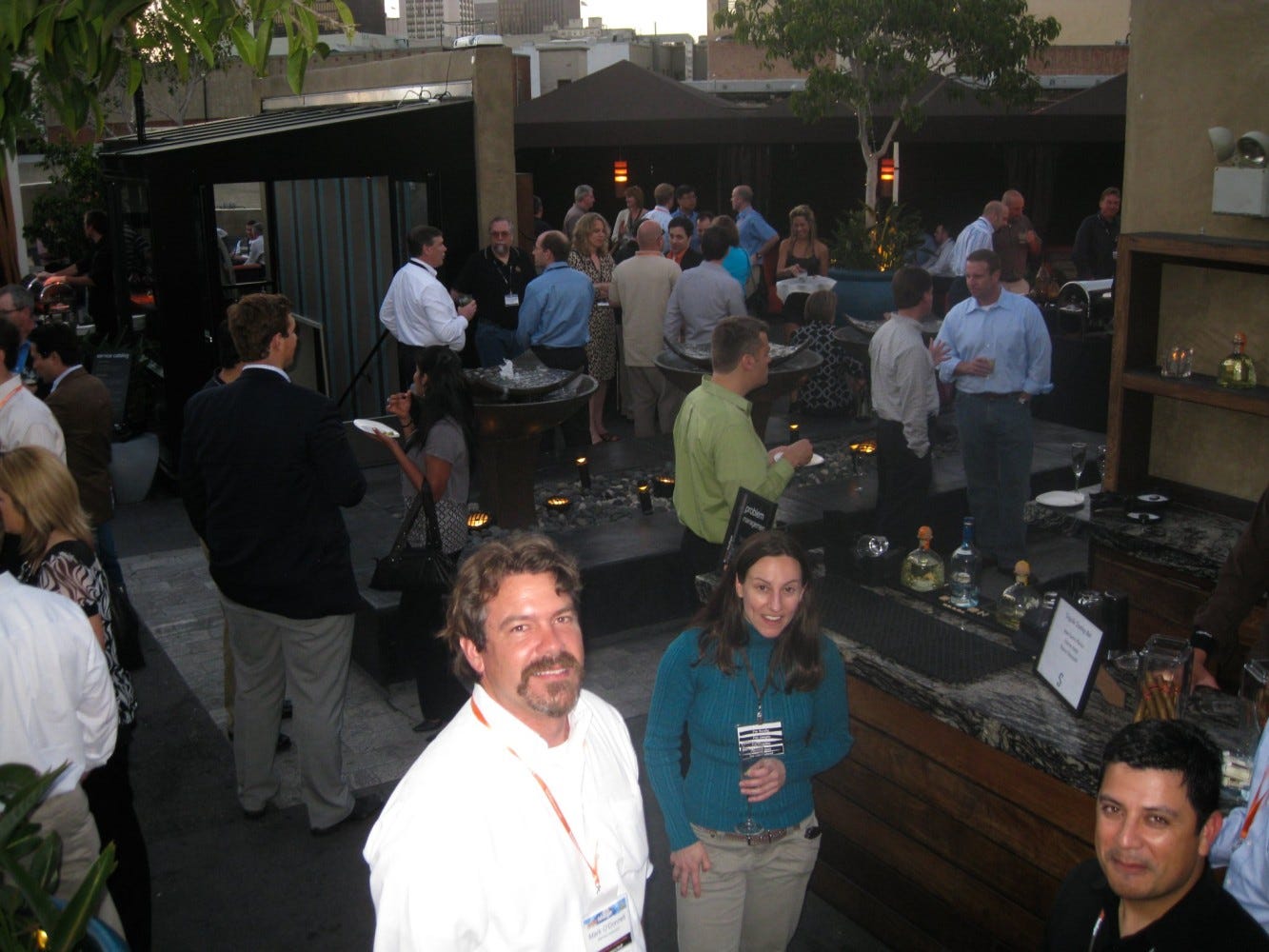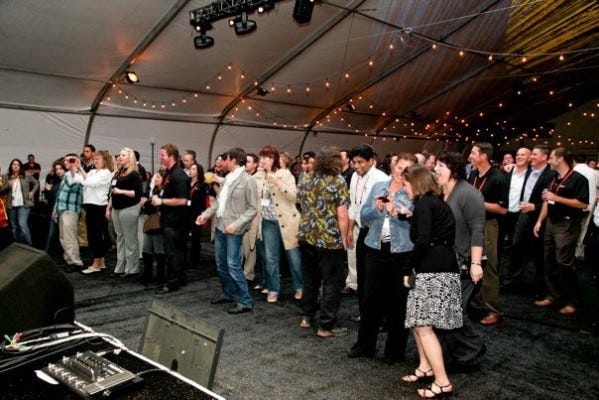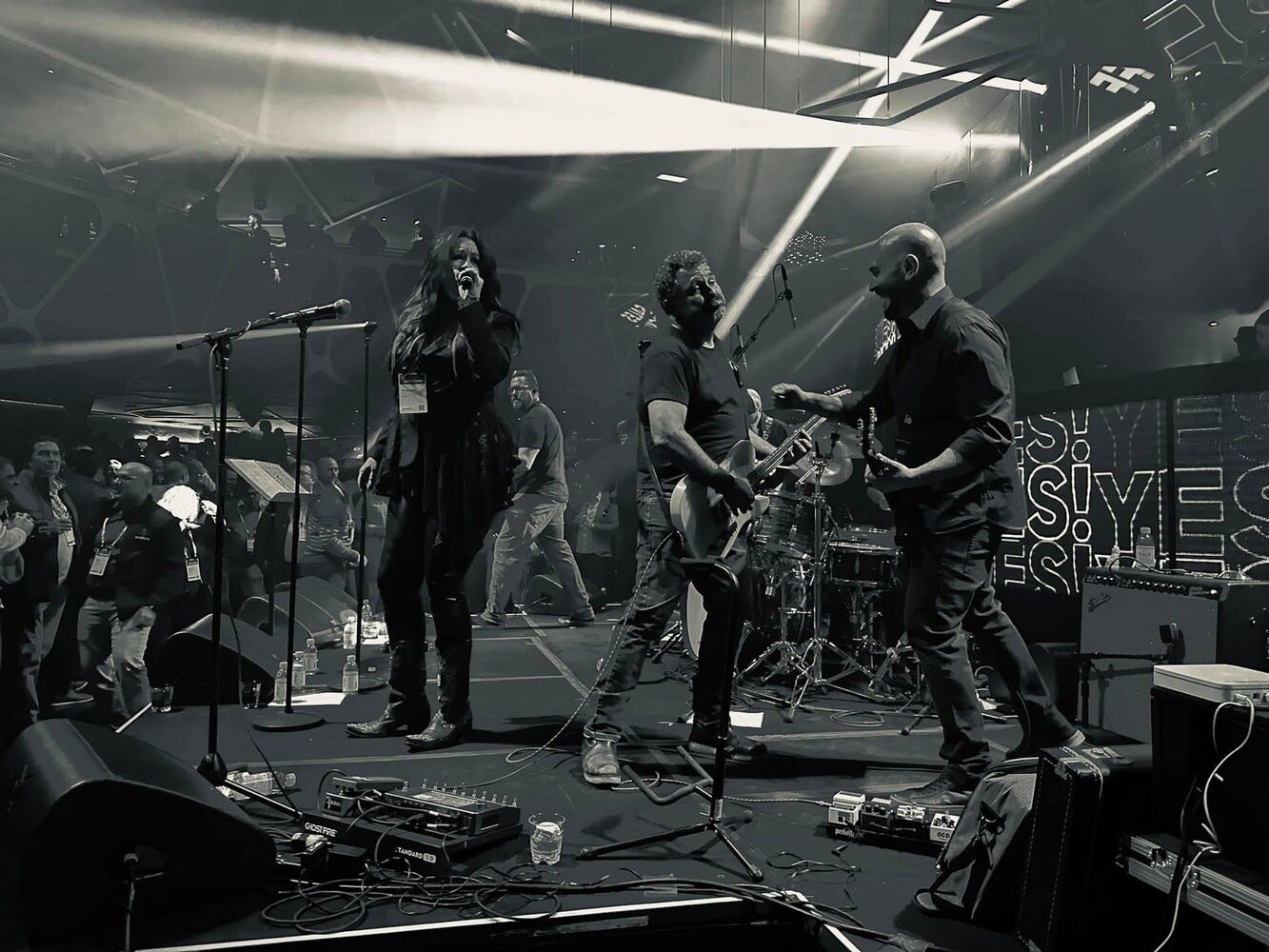Playin' In The Band
Rain, rock and roll, and the true meaning of Knowledge.
Rain, rock and roll, and the true meaning of Knowledge.
‘Tis the season for Knowledge. The annual gathering of the ServiceNow faithful, bringing people from all corners of the globe. They come to learn, to share, to connect. People look forward to seeing past associates and reminiscing over legendary projects. They come to see their favorite ServiceNow person and get the latest information. They come to see the crowd, all the other people who use this technology day in and day out. They come to see what the CEO has to say and maybe, just maybe, get a selfie with Fred Luddy.
If everything goes according to plan – trains, planes, automobiles – I will this year be attending my fifteenth Knowledge conference.
I actually attended my first Knowledge two weeks before I started working at ServiceNow. I think there were three hundred people there. It was at the Omni downtown San Diego.
It was pretty damn funny. I knew precious little about what I was getting into, which was creating a new documentation team and substantially upgrading the information experience for our - even then - rabid customers. Unbeknownst to me, there had recently been a semi-rebellion, good-natured, but serious, about the documentation, or lack thereof. Users wanted more than we had at the time, what Pat Casey categorized to me as “developer’s Cliff’s Notes.” But at least they were in a wiki, which was cool.
My hiring manager thought it would be a good idea for me to attend the conference and, more specifically, the session on documentation and the improvements coming. As it turned out, the main improvement coming was me, a new leader.
The room had about fifty people in attendance. I watched from the back rows as my boss did a very high-level overview of what was planned. The two people who made up our full complement of 1.5 full-time writers, Guy Yedwab (now a lawyer) and Steve Wood (current whereabouts unknown), also stood up and talked about some of the latest pieces of doc that had been published to go along with our latest releases.
At this point, a very vocal user stood up and said, “All this is fine, but this isn’t going to come close to even touching how much help we need. You. Need. To. Document. This. Product. Now.”
Substantial clapping, head-nodding, and verbal agreement followed. My boss, seeing the opportunity, said, “Yes and we are making a significant investment by bringing on a new leader.” And he pointed to the back of the room, at me and said, “Wally Marx!”
Eeep.
All eyes swiveled to the back of the room as I rose from my seat. Wally who? Ok, so I hadn’t started yet. And I didn’t really have a plan. And I only kinda sorta knew what the company did. And these people are looking for an answer. No problem.
Clearing my throat, I said, “We all agree this is an issue. We hear you and we are ready to substantially upgrade our documentation. We want to work together to make this the best.”
It was a decent save. The point was made. I tried to be as enthusiastic about helping them as they were about needing help. I think I may have ended with “We will write like the wind!” or some such battle cry.
This showed me, and all of us, what conferences are supposed to do: make ground-level connections. Face-to-face, powerful exchanges of dynamic information. Reality meets reality, user to builder. The opportunity to match vision on a cellular level, something that requires hearing voices and seeing expressions.
It’s not all that different from playing in a rock and roll band. (Alert: story pivot.)
When you’re playing in a band onstage, eye contact and body language are key. Real-time dynamic communication. Not only do you signal to each other the mechanics of the song being played at the moment (speed up, slow down, louder, for god’s sake what are you doing, where are we, that ruled, that sucked) but you also add to the sound with sight into the emotions of the other players. They are either loving what’s happening or not. They might be in some kind of ecstasy or experiencing profound agony. Not to get too dramatic, but people are being touched in a way that only comes from playing music because it is a vulnerable thing. You open up emotions in order to play. And you do that in front of other people. Sometimes a lot of other people. This is why some musicians drink, which is another story entirely.
In a work environment, it gets doubly tricky. Who wants to risk showing emotion in a work environment? This is also why people are nervous to share in front of a group. It’s a bold person who stands up and says “Your documentation sucks” in front of fifty people and the doc manager. It’s a bold person who shows any true passion in front of the work crowd (ahem).
Which is what playing in a work band is all about. And why workplace bands are so popular. And why every company should have its own band. Talk about driving culture.
ServiceNow has had a band since day one. It’s called zBoot, which is both a cool name and a feature of the product. My first milestones at ServiceNow go like this: 1) first Knowledge conference, 2) first day at ServiceNow 3) first jam with zBoot. All of this happened in April of 2010. Hello, compacted series of life-changing events.
zBoot had a coming-out of sorts when we blew away the hired band at the 2010 Christmas party. We were stacked with talent. The tacit rule of the band was everyone had to be an actual musician, with band experience. We had that in spades. Practicing – and drinking – relentlessly in the basement of the Wooden Spaceship we put a tight set together that impressed everybody.
It got us our next gig: Knowledge 11.
The zBoot gig at is remembered in company lore for a few reasons. First, we killed it by playing a twenty-five-song set of rock and roll that blew people away. Second, because the event was hampered by rare San Diego rain, we had to move from an outside bar to the keynote stage. Lead singer Rob Phillips hooked up his Mac and got us an amazing (for 2011) background on the screen behind us.
The third reason this gig is held special is that it showed a larger number of ServiceNow users, the attendees of the conference, exactly who we were. I don’t want to take too much credit, but I think this helped shape ServiceNow in the minds of many customers. I go by what people told me: you guys walk the walk. You build your own software, you use your own software, you even play your own music. And it’s good!
And that was the point of it, at least to me. Eat your own dog food, use your own software, play your own music. Put your heart into it. Put your money where your mouth is. Get in the ring, get onstage. Open up a little, take a risk. Show us who you are. Do it all with sincerity, not about ego. We really do want to make a good product. We really do want to play good music. We want our artwork on your refrigerator, as Fred used to say. Our music on your iPod. We’ll do what it takes to make it happen.
This year they have a big star playing at Knowledge. I get it. Times have changed. We don’t have a wiki anymore, either.
But we’re all still in the band.






